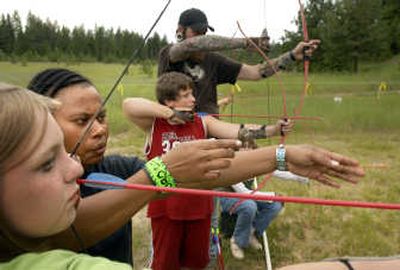Camp a joint learning experience

DEER LAKE, Wash. – You wouldn’t think the American outdoors has much that would scare an Australian, whose country is home to the 10 deadliest species of snakes, not to mention some particularly nasty spiders.
But as Brad Nelson sees it, you can’t really outrun a cougar or kill a bear in a fair fight.
Fortunately, there hasn’t been a large-predator sighting in a number of years at Camp Gifford, where 25-year-old Nelson, of Newcastle, Australia, is a lead counselor.
More than half of the 20 counselors at the Salvation Army’s summer camp on Deer Lake are from countries other than the United States, and Australians are the largest foreign contingent by far.
Most of them come from the Salvation Army’s School for Youth Leadership in Newcastle, a nine-month residential course that includes practical experience such as working as camp counselors.
Large residential camps such as Gifford, while common in the United States, are not seen in Australia, said Nelson, who is employed by the school.
“We come here for the adventure and the experience,” he said. Besides, “Americans love the accent.”
But Australians trained in helping troubled youth have another reason to come to America – it’s where the troubled youth are.
“There’s nowhere near the problem in Australia,” which has been much more willing to spend government funds on social problems like homelessness and joblessness, Nelson said.
Counseling also provides a rare opportunity to visit the United States, said Rebecca Erick, 27, of Lae, Papua New Guinea.
Back home, Erick works for philanthropic organizations such as the Rotary Club. Recently she has been doing research for an anniversary memorial to Amelia Earhart, the American aviator who disappeared after taking off from Lae on July 2, 1937, and is much revered in that country.
“Back home kids are more shy, less educated and hard to communicate with,” said Erick, who also attended the School for Youth Leadership in Newcastle. But many of their problems are the same, she said, citing drugs, alcohol and AIDS.
She said she has a passion for working with youth and would like to use what she has learned to help the children of Papua New Guinea who are the victims of homelessness and domestic violence.
For young people like Erick, Camp Gifford is the perfect place for on-the-job training.
Most of the 700 children, who spend one of seven weeks out of the year at the lakeside camp, can’t afford to go anywhere else. The Salvation Army subsidizes the full price of $200 for a week at camp based on income. Camp Gifford also specializes in helping children with behavioral problems, foster kids and “some of the toughest kids that no other camps are willing to accept,” according to a Salvation Army statement.
The children come from Idaho, Montana and Eastern Washington. Most are from the Spokane area.
In 2006, about 4 percent of campers were homeless, 14 percent were from foster homes and about 86 percent were from homes at or below the federal poverty level, said camp administrator Jeff Potts.
At the beginning of each season, the camp requires its staff to go through training developed by the Salvation Army that includes how to recognize signs of abuse and potential abusers among the children, ages 7 to 17. Such signs, Nelson said, might include eating disorders, emotional insecurity or anger.
The camp files at least two and sometimes as many as 12 reports each summer with state Child Protective Services about children who have confided in counselors about being abused in their homes, Potts said.
“Something will trigger them, and they will open up,” Potts said.
Counselors, who must be 18 or older, must undergo screening that includes criminal background checks and contacting three references. Campers are never alone with fewer than two staff members.
“We even get taught how to hug a kid here,” Nelson said. “Side-on hugs, and we can only touch on the shoulder.”
Such concerns are not nearly as common in Australia, he said, though they are becoming more so. Counselors work long hours with potentially difficult children for low pay, $165 to $180 a week.
“It requires maturity and responsibility and a willingness to comply,” Nelson said. In exchange, the counselors receive valuable experience that will help them land careers in service to youth.